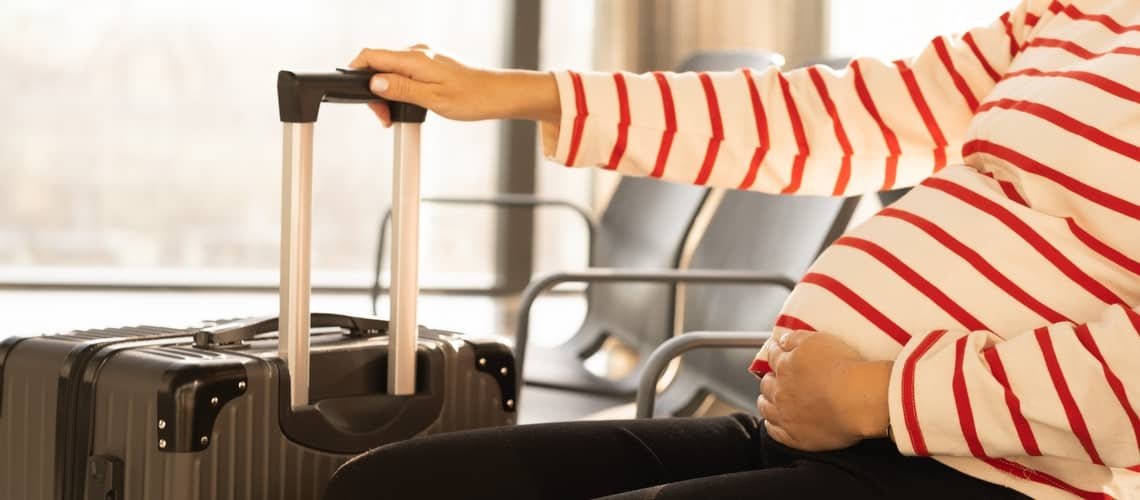
Flying during pregnancy. Is a long flight in the first trimester dangerous?
Taking a vacation during pregnancy is a feasible plan for air travel if you meet a few essential conditions. For long years in pregnancy, it is important that the pregnancy is not accompanied by major health complications, but also by the stage of pregnancy in which the woman is. Flying is both safe and permitted for a woman up to the 36th week of pregnancy. Although there is still no general proof of the harmfulness or danger of flying for pregnant women, each case is individual, and therefore certain complications cannot be ruled out with certainty.
- How long is flying allowed during pregnancy?
- Risks of long flights during pregnancy
- Medical certificates and formal requirements before a long flight during pregnancy
- Comfort as the first condition for traveling during pregnancy
- Women's experiences of flying during pregnancy from discussion forums
- The most frequent questions - FAQ
- Comments
We will answer why the second trimester is the most suitable period for flying during pregnancy, what risks must be taken into account when flying during pregnancy, but also what are the conditions and requirements in this matter from the airlines, in the following paragraphs.
How long is flying allowed during pregnancy?
In general, a woman can fly wherever she wants until the 28th week of pregnancy, without any special requirements from airlines. Between the 28th and 36th week, however, there are already certain reservations regarding the permit, or certificate from a doctor, while after the 36th week, most airlines no longer take responsibility for pregnant women during the flight. The truth is that most pregnant women in the later stages of pregnancy do not even want to travel by plane.
Flying in the first trimester of pregnancy is not recommended
For many years, there has been a theory in society that flying in the sixth week of pregnancy, or during the entire first trimester, it can potentially endanger the fetus. There are also common conjectures about the increased probability of miscarriage. However, these claims have never been confirmed. Caution is never in vain, but if you do not suffer from frequent feelings of nausea, insomnia or heartburn, you can enjoy the flight as much as possible. Otherwise, if nausea has become a daily part of your life, it is better to postpone any flights to later dates. Or at least properly consider the pros and cons of such a journey.
Pressure changes during the flight often do not have a positive effect even on normal or non-pregnant passengers, which means pitching and sudden changes in flight direction can, for understandable reasons, have an even greater impact on pregnant women. The air conditioning and air system in the plane also record infectious diseases and various degrees of colds. Possible spotting or bleeding during the first weeks of pregnancy is also a reason for delaying the flight.
At all stages of pregnancy, a consultation with a doctor is very important when it comes to flying and vacationing in remote destinations, who can offer you an expert insight into the individual risks based on your previous medical history.
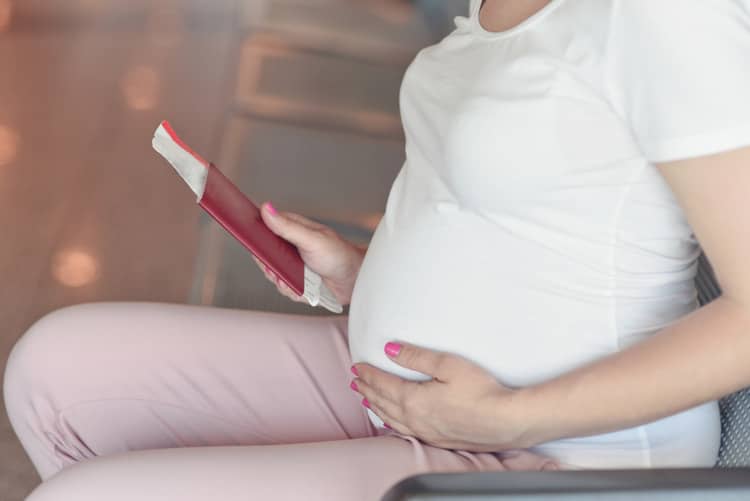
Flying in the second trimester is just ideal
While the first trimester is not the safest for flying while pregnant, the second trimester, specifically weeks 14 to 27, is considered the most ideal time to travel during pregnancy. This time horizon abounds with many advantages, thanks to which you can enjoy a trip, or you will fully enjoy your vacation.
Among others, it is mainly the fact that, unlike the first trimester, most pregnant women are no longer burdened by moments of nausea and do not have the intense threat of miscarriage hanging over their heads. From the point of view of external factors, unrestricted movement and comfort will weigh mainly, since the belly has not yet grown to such dimensions that it indirectly sets greater limits for the pregnant woman.
In any case, it is recommended to have your pregnancy card with you, as airports and airlines may require it from pregnant passengers. We remind you that, even at this stage of pregnancy, it is advisable to consult with your attending physician about a possible vacation that includes air travel, who, based on the development of the fetus, can determine the most appropriate mode of transportation, while from this aspect he also assesses your chosen destination, which may not always be acceptable for pregnant women.
Flying in the third trimester is subject to medical approval
If there were no medical complications during your pregnancy, you can fly until the 36th week of pregnancy. At such an advanced stage of pregnancy, your ability to fly depends on a medical certificate of fitness to fly, which is required by airlines at the beginning of the last trimester.
Women who have reached the 36th week of pregnancy are completely prohibited from flying during pregnancy. In the case of a multiple pregnancy, flying is not allowed from the 32nd week of pregnancy. In this phase of pregnancy, the probability of premature birth, bleeding or premature outflow of amniotic fluid increases , which can be triggered by a number of different external factors. A change in pressure, shaking, but also excessive stress, which many people experience on the plane, can be the trigger during the flight. There can also be a risk of the formation of blood clots, the cause of which is a lack of movement during long flights, or its limitation, but also the dry, recycled air inside the plane.
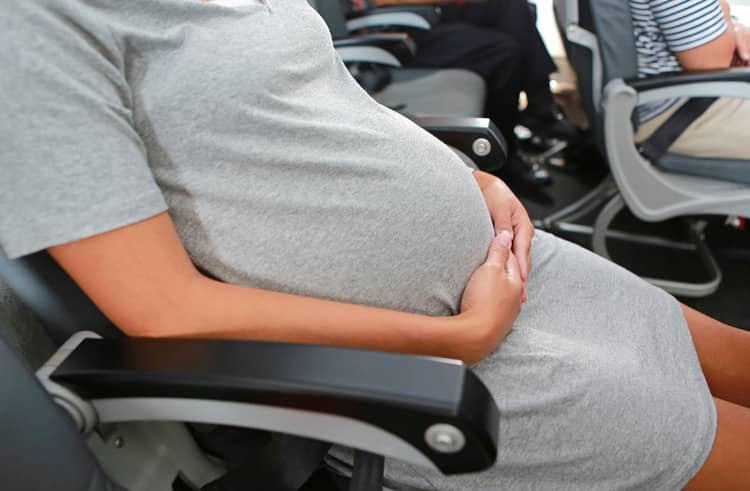
Risks of long flights during pregnancy
The airport, as well as the plane itself, are characterized by certain situations and processes that can mean certain inconveniences and even risks for pregnant women.
Effect of pressure changes during flying in pregnancy
Above, we have already mentioned pressure changes, which are most noticeable during take-off and landing. Our body copes with these processes during the flight by resting in the ears. While such significant pressure changes affect the majority of passengers, ordinary people may not feel it more mildly, but pregnant women are also much more sensitive in this regard. Pregnant women can be reassured that there is no risk to the developing fetus due to changes in pressure.
Another risk associated with pressure is low blood pressure, which can lead to deviations from normal pulse and blood pressure in pregnant women. Even in this case, this pressure-related factor does not directly affect the fetus. It is more about the comfort of the pregnant woman, which is disturbed by such external influences during flying during pregnancy. So, if you suffer from any serious problems with pressure, to be sure, inform the flight staff in advance, who are in charge of the comfort and satisfaction of their passengers.
Dizziness due to the insufficient amount and inadequate quality of oxygen in the plane is completely natural for pregnant women, while this problem can be corrected very easily, with the help of adjusting the air supply, which is available above the passenger seat. Problems with pressure or breathing in the plane can also be solved with the help of an oxygen mask, which will be made available to you by the on-board staff on the plane.
Turbulence is a natural part of air travel. This factor can pose a risk to pregnancy only if the pregnant woman does not sit in her seat during turbulence, which can lead to injuries of various nature. Turbulence is accompanied by a warning to the flight staff about the need to fasten seat belts. For pregnant women, they are fastened under the belly during the flight, which prevents unpleasant pressure on this area of the body.
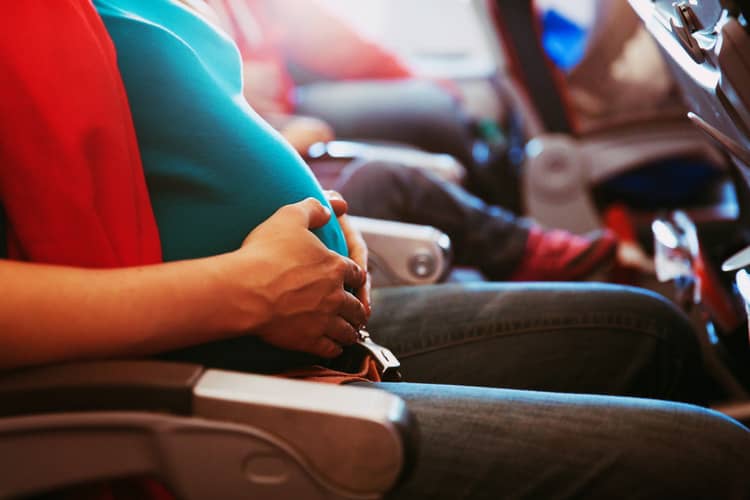
Risk of blood clots during air travel during pregnancy
Above, we briefly mentioned blood clots, which can be dangerous during air travel during pregnancy, especially during longer flights. Then the person remains in a state of inactivity for longer, which means that his blood circulation slows down, which can lead to the formation of blood clots and thrombosis. If you feel discomfort, regular exercise of individual parts of the limbs is recommended, which will naturally increase blood circulation in them. You can, of course, also walk down the aisle, and you should do this physical activity at least every 30 minutes or an hour
Going through the detector before the flight while pregnant
A typical process that precedes the flight itself is check-in, where pregnant women are misled about the danger to the developing baby in their belly by going through security. One of the greatest dangers for the fetus is the exposure of a pregnant woman to X-ray radiation. However, this is not a threat at the airport, as only baggage is checked by X-ray. Persons pass through the security gate for the detection of unauthorized objects, which is completely harmless thanks to its functional principle consisting of an electromagnetic field. This typical airport action therefore poses no danger for pregnant women.
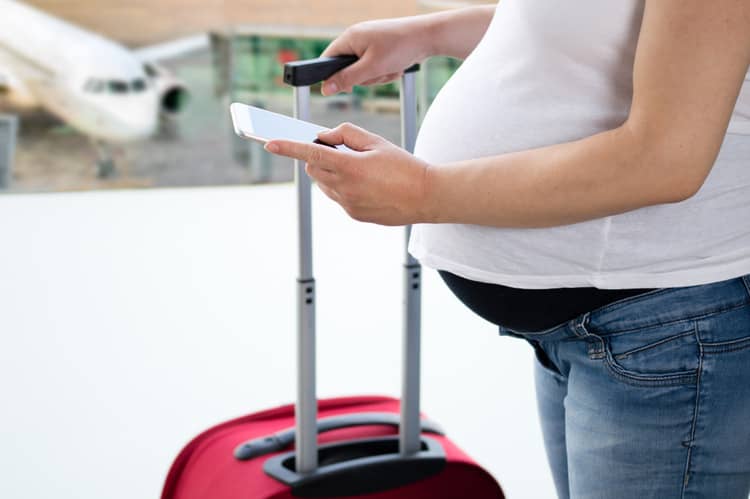
Medical certificates and formal requirements before a long flight during pregnancy
Before any long flight, it is advisable to consult your gynecologist, i.e. the most qualified person to evaluate your situation. If your doctor approves the flight, the next appropriate step in case you want to avoid unpleasant surprises is to check the requirements and conditions of the transport of pregnant women by the particular airline. This information can be found on the websites of individual airlines.
If the airline requires a medical certificate related to the course of the pregnancy, it is very important that this medical certificate is not older than six days. Another condition is the need for a foreign language version of this document, while English is most often required. As a rule, the confirmation must contain information regarding the number of pregnancies, i.e. whether you are expecting one child or more, in which week you will be at the time of the flight (including the return flight), but also the confirmation from the doctor about the fitness to travel by plane at a specific stage of pregnancy. An important part is, of course, the doctor's signature and stamp, while the exact date of the signature must not be missing either.
Most airlines can also inform about the week of pregnancy through your pregnancy card, so it is always better to have it with you at all times. While after the 28th week, a simple medical certificate or information from the pregnancy book is sufficient for most airlines, in the case of pregnant women and their transport after the 34th week, it is necessary to provide the official medical form MEDIF (Medical Information Form) . It is available on the websites of individual airlines, or the carrier itself can send it to you by e-mail upon request. If a pregnant woman in a late stage of pregnancy is not proven to be pregnant before the flight with this certificate, the airline is entitled to refuse her transportation for security reasons.
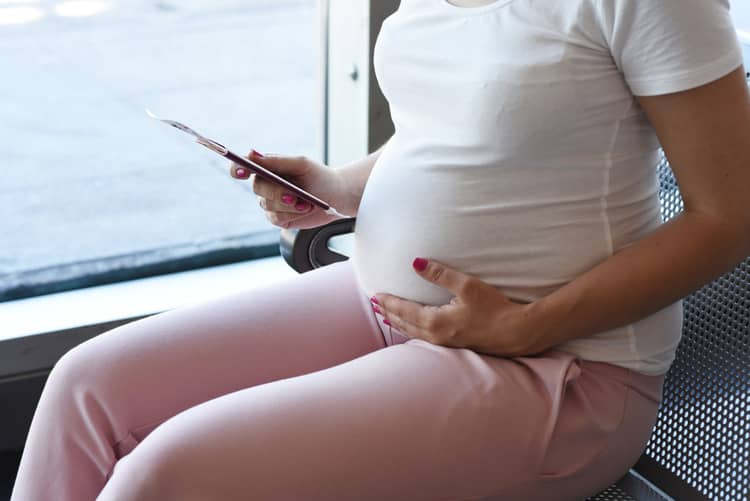
Comfort as the first condition for traveling during pregnancy
As for every ordinary person, comfort is the most important thing for pregnant women during flying, which you can take care of in the form of comfortable, non-restrictive clothing and shoes. Another important rule is to never suppress your need in the form of toilet visits. Rather, you should use this opportunity to stretch your limbs as often as possible, while regular movement should be included in your flight schedule. In connection with these physical activities, it is better and more convenient for pregnant women to choose a seat in the aisle. This will allow them to move and access the toilet without any "harassment" of the passengers sitting next to them.
In general, regardless of the stage of pregnancy, you should always prefer closer destinations that are not subject to long flights. 2 to 3 hours are most ideal. Even in the case of such relatively short flights, it is essential that you eat properly before you get on the plane. An empty stomach is never a guarantee of a comfortable flight without problems and possible nausea. It doesn't matter what diet you take before the flight. It is important that these are not ingredients that make your flight unpleasant. Therefore, avoid broccoli, cabbage or drinking sugary drinks, which have a multiplied tendency to bloat at higher altitudes.
Adhering to the drinking regime is very important even on the plane during pregnancy. Even in this situation, water without bubbles is the best, which regardless of the airline, the airline staff should also be able to accommodate you, in the form of a free glass of water. If you plan to fly while pregnant, it is recommended that you notify the airline company in advance of your health condition, so that nothing surprises you at the airport or during the flight. On request, they can also treat you to a more comfortable journey in the form of priority check-in or a better seating location, which usually has more legroom.

Women's experiences of flying during pregnancy from discussion forums
Various forums are very popular platforms for many people when it comes to maternity matters, and the presence of the topic of flying during pregnancy is no exception on the forums. As we mentioned above, the experience of flying during pregnancy can be different for every pregnant woman. The participants of the discussion forum on the issue of traveling by plane in the first trimester on the well-known Blue Horse website also agreed on this.
While some answers sounded in favor of flying in the early stages of pregnancy, since they did not experience any complications, and the baby and they were fine after being transported by plane, others strongly advised the questioner to consult her doctor thoroughly, because they could confirm from their own experience, that the flight in the first trimester cost them certain complications during the flight, or immediately after arriving at their dream destination. However, there was also a case where the flight in the 6th week of pregnancy ended with a spontaneous abortion for the discussant.
Many answers also acknowledged the fact that in the first trimester it is better to postpone long flights to later dates, preferably to the second trimester, since in the early stages of pregnancy anything can really cause complications that can even result in the aforementioned abortion. Sad, but really interesting information was provided by the discussion post of an anonymous flight attendant, who clarified that female flight attendants generally have problems getting pregnant, mainly because of frequent flying and therefore pressure changes.
The flight attendant also mentioned her own experience, according to which she had to end her employment with her airline due to her desire for a baby in order to get pregnant at all, while she also expressed her strong disapproval of pregnant women boarding the plane, which followed the difficulties that in her she described the post. As we have already mentioned, everything depends on the individual anamnesis of the pregnant woman, on the basis of which the doctor assesses the suitability of traveling during pregnancy. A lot of weight is also attached to the exact stage of pregnancy in which the woman is at the time of the flight.
The most frequent questions - FAQ
Are you interested in other contexts in the matter of flying while pregnant? Can you think of other questions that were not answered in the text of the article or in the question and answer section? Feel free to put them in the comments below the article. We will try to answer them as soon as possible.
Can I fly at a later stage of pregnancy if I had major health problems in the first trimester?
How long is it possible to fly in the case of a multiple pregnancy?
Under what circumstances should one not travel long distances by plane during pregnancy?
Does the permission to fly during pregnancy depend on the age of the first-time mother?
Is frequent flying safe during pregnancy?
Pridať komentár





